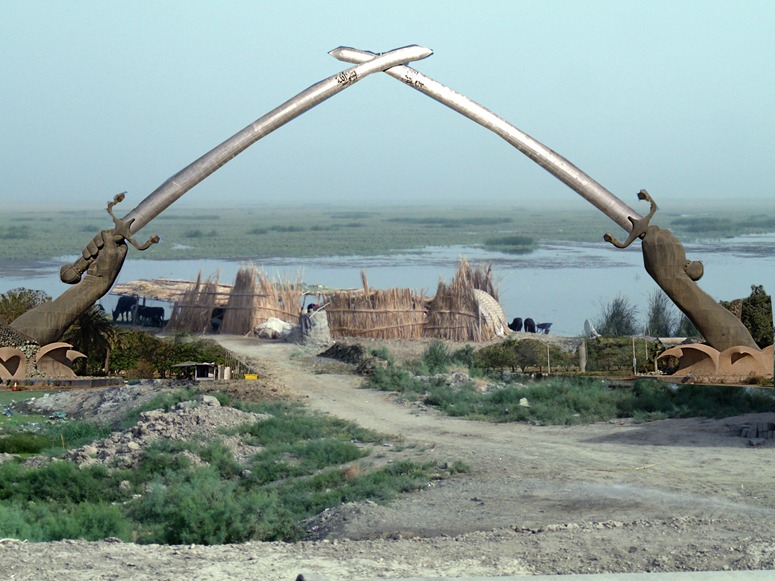
Saddam Hussein’s Victory Arch in Baghdad is being restored – with mixed feelings among commentators. Meanwhile, the habitat of the Marsh Arabs is also being restored. But the Marshes, which are often identified as the geographical location of the Garden of Eden story, now have only a few thousand inhabitants instead of the half-million who lived there before the wicked Saddam Hussein drained the marshes. My proposal is to make an area of marshland around the Victory Arch in Baghdad to symbolise the victory of the wetlands over the dictator. It could also create a tourist attraction, a wildlife resort, a water management facility and a recreation area for the oppressed people of Baghdad. The name of the city could mean Bag “god” + dād “given”, translating to “God-given” or “God’s gift”. Or it could mean Bağ “garden” + dād “fair”, translating to “The fair Garden”.
Images courtesy pennstatelive james_gordon_los_angeles

Extrapolating that vision exponentially =This whole world could be a tourist destination in every corner of the Globe now that would be a Fair Garden to wander in.
If people are determined to travel during their vacations then, yes, I think it is a good idea for the whole world to be a tourist destination. When too many people gather in one place the place gets wrecked.
With regard to Christine’s question ‘Do you suppose the Marsh Arab’s might approve of your proposal?’, I think the answer is ‘Yes and No’. They would probably like the idea of a memorial to their lost homeland. But, like primitive peoples everywhere, they probably dream of living in small bungalows with big refrigerators, soft furnishings, soft toys and soft lives.
Do you think this reflects a change in the national myth of the Marsh Arabs? [ http://en.wikipedia.org/wiki/National_myth ] Perhaps from a garden paradise to a more settled urban and technologically driven existence?
I think it is more than the Marsh Arabs: I think most of us wish to enjoy the comforts of modern life while also being proud of the lives which our ancestors lived. The latter is the famous myth of the Golden Age.
The Golden Age in this latter sense is ‘soft’ primitivism (Lovejoy & Boas): “conceives of primitive life as a Golden Age of plenty, innocence and happiness – civilised life purged of its vices.” Rather than ‘hard’ primitivism: “an almost subhuman existence full of terrible hardships and devoid of all comfort.”
So the question is how do the Marsh Arabs view their current lifestyle? As a life of plenty, innocence and happiness or as an existence full of terrible hardships and devoid of all comfort?
It is an interesting question to ask when considering the dual ideas of material and spiritual progress. How do we understand progress when we talk of modern life?
Perhaps there is also a ‘soft’ modernism: through acquiring the comforts of modern life we are moving towards a return to Paradise a life of “plenty, innocence and happiness”?
And a ‘hard’ modernism: through acquiring the comforts of modern life we are moving towards an existence “full of terrible (spiritual) hardships and devoid of all (spiritual) comfort?”
So the question becomes what is the relationship, if any between material and spiritual wellbeing?
Your interesting distinction between ‘soft’ and ‘hard’ primitivism reminds me of tough sports and extreme sports. Ocean racing, for example, is said to be like standing under a freezing waterfall while tearing up banknotes. It can be painful, exhausting and dangerous. But people yearn for hardship and achievement. I think it is a bit like that with hard primitivism: when you are sitting in comfort, you can dream of the dangers experienced and the hardships overcome. In the case of the Marsh Arabs there must be a terrible grievance that a dictator destroyed the lives their ancestors had lived for so many thousands of years. A BBC report on the fate of the Marsh Arabs concludes: “The Marsh Arabs I know are in a state of desolation and utter hopelessness. They have been treated as no human beings should be treated and virtually no one has done anything about it”. I think an inexpensive and evocative memorial might help, if only an iota.